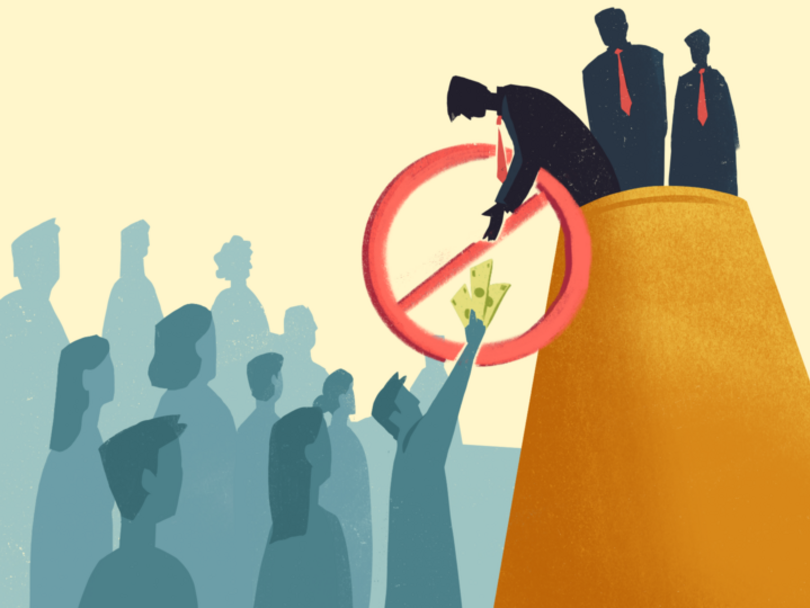Opinion: Try boycotting as a safe alternative to street protests

Recent company exposures must be met with accountability, our columnist writes. Transparency about where money goes helps avoid supporting companies aligning themselves with problematic policy. Flynn Ledoux | Illustration Editor
Get the latest Syracuse news delivered right to your inbox.
Subscribe to our newsletter here.
Nothing garners more attention in a capitalist society than a loss in revenue, and Elon Musk is feeling this reality firsthand. Local, national and global outrage toward Musk’s role in slashing federal funding as a non-elected official is fueling protests and a boycott against Tesla.
This collective backlash and plummeting stock are draining the billionaire’s pockets and pushing him to a new breaking point.
A boycott is our right to decline the purchase of certain consumer items. While the Tesla boycott may be gaining the most media attention right now, it’s important to recognize it’s certainly not the only one you should be paying attention to.
I first dove into boycotting as a way to combat fast fashion. After learning about the ethical and environmental impact, I was moved to minimize the industry. It was almost unbelievable that consumers could turn a blind eye and purchase polyester garments designed for the landfill.
Today, fast fashion is a market worth $150.82 billion. While CEO pockets are lined, 92 million tons of textile waste are dumped into the environment each year, polluting our air and water more with every ounce of debris.
Unless legislation is passed to ban fast fashion, targeting corporate greed through boycotting companies like Shein and Temu is a feasible solution. There can’t be a supply without a demand, so I strictly buy second-hand garments as a way to boycott and teach others how to do the same.

Cole Ross | Digital Design Director
I now avoid companies outside of fashion for similar, shockingly devious ethical concerns. Amazon exploits its workers and quite openly hates the environment. Prison labor, the equivalent to modern-day slavery in America, is kept alive through companies like Walmart and McDonald’s.
While some argue there’s no ethical consumption under capitalism, I sleep better knowing I’m doing my part to at least avoid the worst of it.
The internet influences boycotts’ quick responses to unfavorable corporate decisions. Target’s cut of its DEI initiative kicked off a massive boycott, with over 15 million TikTok videos posted under the “Target Boycott Protest” hashtag. More than 100,000 people have pledged to boycott the store for 40 days.
In other realms, the BDS movement boycotts companies complicit in the occupation of Palestine, like Dell. While the boycott hasn’t had a significant impact on the Israeli economy, it’s brought attention to injustices against Palestinians.
Recent exposures have shown me that a lot of entities publicly engage in evil acts without much accountability. But boycotts continue to provide me and many others with an accessible act of protest that allows us to be active participants in global calls for change.
Withholding your funds from those you don’t agree with can be easier than protesting on the street. If that protest is scheduled during your shift at work or a class, you’re not going. Committing to buy produce at the Syracuse Cooperative Market instead of Target, on the other hand, is more realistic.
Boycotting is also more accessible to those who are disabled. Picking up a sign and marching in the streets may seem like an easy task to those who are not living with a disability, but this could be an impossible task for those who are.
This form of protest is also less dangerous. I’ve never felt safe marching for a cause in person because of the United States’ history of targeting protesters. In the 1970s, the national guard opened fire on students at Kent University protesting the Vietnam War. They killed four students and wounded nine.
Even today, the Trump administration is rounding up students who speak out and protest in support of Palestine. The thought of being arrested — by officers in plain clothes — while advocating non-violently for your beliefs is a terrifying new reality.
Boycotting is a peaceful, alternative form of protest deserving of more attention. Anyone can try a small act of defiance at the grocery store or a purposeful switch to a small business.
Since the American government is happily holding hands with corporations and oligarchs, we need to step up where others won’t to hold them accountable. If you are frustrated with America’s lack of political change but don’t want to pick up a sign and picket, think carefully about where you’re swiping your card and spending your cash.
Who you support monetarily may seem insignificant, but if we take a stand together, there can be a noticeable, tangible impact.
Bella Tabak is a junior majoring in magazine journalism. She can be reached at batabak@syr.edu.






